For fans jaded by overt professionalism in sport, decisions made without a business motive, or, at least, one that will not pay instant dividends, are not merely refreshing, but strike at the heart of what makes it so captivating.
In the summer of 2012, Michelle Dillon was at a crossroads in her career. The former Commonwealth Games 10,000m runner and sixth-place finisher in the Athens’ Olympic triathlon had been coaching an elite group of London 2012 hopefuls including Will Clarke, Jodie Stimpson and her own husband, Stuart Hayes.
Once the chase for selection and the crescendo of Hyde Park had petered out, it was time for all to take new directions and for Dillon to consider her options. The truth for multisport coaches is that financial rewards lie with schooling large groups of trusting amateurs. Most professionals don’t earn all that much, meaning coach earns a percentage of not a lot for a role that can demand undivided attention – particularly if the athlete in question has never attempted the sport before.
So when Emma Pallant came knocking, a successful junior runner, plagued with injuries and not sure where to turn having hobbled away from a 5,000m trials race and her quest for the London Games, the most cost-effective decision would have been a polite ‘No’.
That it wasn’t says a few things: Dillon has strength of character; a hunger to still be involved with elite sport; and, most pertinently, that in this runner from Farnham, who could be a little firebrand at times, she saw an image of her younger self and a kinship could blossom. Project Pallant was underway and it wasn’t to be the smoothest ride.
“After London, I made the decision I wouldn’t go for a big group of elite triathletes, having done four years of it,” Dillon says. “I receive quite a lot of emails from up and coming athletes, but not many put the light on like Emma’s. I come from the same high-level running background having competed in the world cross-country as a junior and 1994 Commonwealth Games at 21, and I could appreciate where she was with the injuries.
“Something said: ‘Let’s do this’”
“It was why I switched to triathlon. I thought she probably couldn’t swim, wouldn’t have a clue how to ride a bike and would be starting from scratch. But something said: ‘Let’s do this’.
“Stu’s mum told me to give her a call. We got on really well. It was a ‘your journey will be my journey’ approach and in two years we’ve developed a good relationship. I’m so glad I made that decision.”
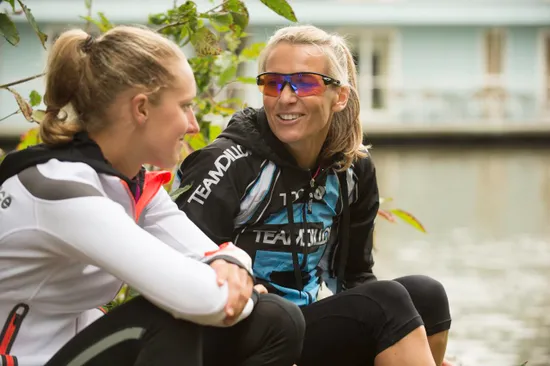
“What struck me was how passionate she was,” Pallant recalls. “Most people I told I wanted to be a world-class triathlete would laugh, but Michelle took it seriously. I’d only known her two months and she was lending me her bike, Speedo wetsuit and trisuit.”
Born in Surrey, the successful Aldershot, Farnham & District athletics club, where veteran coach Mick Woods presides, would capture a large chunk of Pallant’s youth. “I’ve never really known life without sport,” she says. “I was hyperactive as a kid and have an amazing mum who would take me to every sports club. Mick said if I wanted to be the best at one sport I would have to focus my attention and I’ve always liked the idea of being the best.
“Success breeds success and if you a have couple of strong runners forming good friendships, like myself and Steph Twell, the social life integrates with the running. It was fun growing up in the club.”
Pallant was rarely headed at Under-11 and Under-13 level, even clashing with 2013 triathlon world champion Non Stanford on occasion. “I think we were pretty level paced,” she recalls. “Although as she’s Welsh, I’d have the advantage of a stronger backing team for the relays.”
Under Kelly’s wing
When stress fractures and knee injuries began chipping away at that competitive edge, the invitation to join up with Athens’ double-gold medallist Kelly Holmes instilled fresh confidence and opportunities to gain experience shadowing more senior athletes.
“We went to Berlin for the World Championship in 2009 and Delhi for the Commonwealth Games the following year,” she says of the same On Camp with Kelly initiative that mentored Stanford and world 1,500m silver medallist Hannah England. “I achieved the qualifying time for Delhi but then got injured. We still went to the athletes’ village, ate with them and saw how the Games operated, so when we did make a championships we could concentrate on the racing.”
Sadly, it didn’t come to fruition. Pallant had stepped up to the 5,000m by 2012 figuring she could cut back on the gym weights, race with a lighter frame and not put so much impact through her knees. The plan was to achieve an Olympic slot through the European Championships, but when she dropped out of the trials race, the knee flaring up once more, the dream was over.
“I was devastated,” Pallant says. “Kelly found me and told me that mentally I needed a fresh goal there and then. The London Triathlon was in two months and it gave me a focus for swim and bike training.”
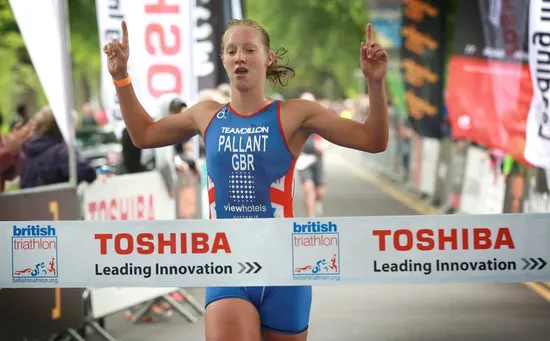
Running her own physiotherapy clinic, Pallant had treated and become friendly with Katie Hewison (who recently retired from international triathlon), and knuckled down to some tri training. Swims with Hewison were mixed with spin bike work and sessions with the running club, but Pallant felt if she was to make a serious stab at multisport a more concrete strategy was required. Cue spotting a Team Dillon hoodie on a club night.
“One of my mum’s friends does triathlon and told me that Michelle Dillon had done what I wanted to do – gone from a runner to a triathlete,” Pallant explains. “If I was serious, no one would know more about the transition than Michelle.”
Click here to continue reading
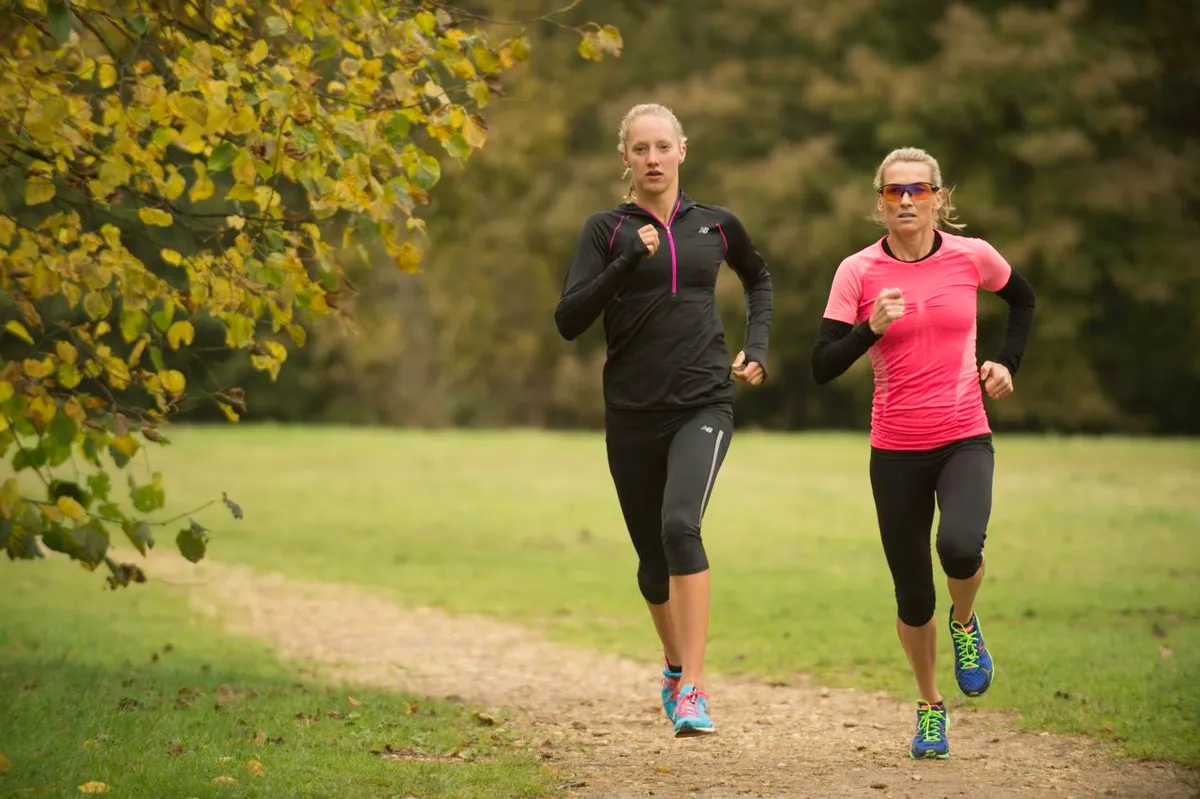
:
Nagging injuries and a fresh challenge are probably the leading two reasons most individuals take up triathlon; Pallant’s ambition to achieve greatest on the world stage was a third.
“As a runner, going on to medal in distance races against Kenyans and Ethiopians would have been very difficult,” she says. “I was looking at being one of Europe’s best. But the best in the world? That was a lot harder.”
Whether she has chosen an easier path remains to be seen. Certainly she’s picked a time to switch when the depth in British women’s multisport has never been greater. In Stanford, Helen Jenkins, Jodie Stimpson and Vicky Holland, the UK has two world champions, and the reigning Commonwealth gold and bronze medallists. If everybody is fit and firing – it’s a halcyon era.
But all that lay ahead. Before she even stepped on to the pontoon to challenge these women, Pallant would need to acclimatise to the increased training load. “The biggest shock for Emma was when we went to the Gold Coast,” Dillon says. “The first day she hammered it out the door.” “And 10 minutes later I was crawling home.” Pallant remembers.
“Poor Emma arrived as a pure, skinny runner, with not much muscle from riding or swimming and a host of problems,” Dillon continues. “I massaged her every night to get the lumps and knots out of her quads, stretched out her hip flexors, and she learnt to run again.”
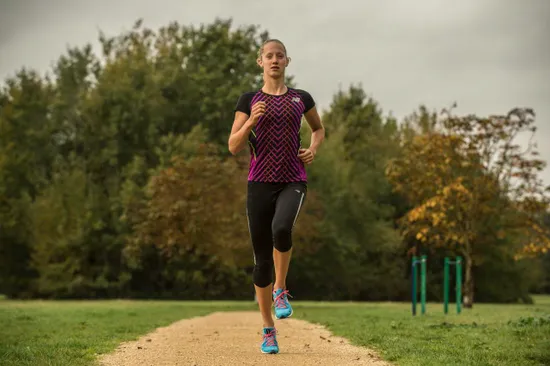
“Before I went I considered myself a runner,” Pallant says. “Now the sessions were so much longer and I really didn’t have much endurance.”
“Emma had a lot of stomach problems as well,” Dillon says. “Eating the wrong things at the wrong time, she’d spend half a long run in the bushes. If we didn’t sort it out she was never going to make an elite athlete. It’s been a two-year process.”
“I’d picked up bad habits from so many different diets,” Pallant agrees. “I cannot put my finger on what exactly was wrong. I’d work a lot and keep busy and couldn’t switch off. It required a lifestyle change to concentrate on what and when I'm eating and to start hydrating properly during exercise. Living with Michelle and Stu, I’m seeing how it should be done and have the self-control to put it into practice in my own life.”
Little Miss Bump
Despite the problems domestic success came quickly. Pallant was sixth in that debut race in London, almost six minutes down on winner Daniela Ryf despite posting the fastest run split by over two minutes, and the following year would be crowned British champion over a sprint distance race in Liverpool.
The international circuit was a tougher challenge, though, and included a couple of DNFs including the World Series Grand Final in London, plus a disqualification in Holland for racking her bike in someone else’s spot and then not stopping for the penalty.
“I didn’t know what a penalty box was,” she explains, compounding a reputation as a somewhat incident-prone individual that has earned the nickname Little Miss Bump. “I’ve been hit in the head with rounders’ bats, fallen off bikes, and run into lampposts and car doors.
"As an Under-13 I was in Marrakech for the World Youth Championships and went to get a henna tattoo, with the idea of pretending it was a permanent one. I asked for ‘GB’, was misunderstood, and became the wally walking round having been branded TB! It was only dye but I had a reaction to it. My mum wasn't impressed. Thankfully, Team Dillon has a bit of a safety angel in Safety Stu who protects me.”
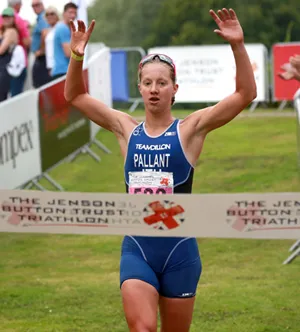 The steep learning curve would continue into 2014, where barely a start-list emerged without Pallant’s name on it including 11 on the ITU calendar and three winning British Super Series outings plus a handful of other victories such as the Jenson Button Trust Triathlon.
The steep learning curve would continue into 2014, where barely a start-list emerged without Pallant’s name on it including 11 on the ITU calendar and three winning British Super Series outings plus a handful of other victories such as the Jenson Button Trust Triathlon.
“She’s had to do it really,” Michelle explains. “We had to work on a lot of technical things: drafting in the swim, being under pressure in transition. And racing in open water with 60 other women is completely different from training with a handful.
“We’ve always taken at least one positive from each race. How far Emma is behind in the swim plays a big part in how it pans out and we’ve seen the time deficit coming down. She biked herself back into the pack in Cozumel [where she eventually finished seventh, 28 seconds behind Olympic champion Nicola Spirig] and held the gap at 45 seconds in her last race in Columbia. At the beginning of the year it would have been three minutes.”
“I’ve got so much to learn but sometimes there is a limit to what Michelle and Stuart can teach me,” Pallant explains. “Stu can tell me not to over-gear, but it’s only when I try running off the bike that I really find out the effects. Then there are the logistics of travel, race briefings, where you swim and cycle abroad, and even putting the bike together. It’s a lot to think about.”
Click here to continue reading
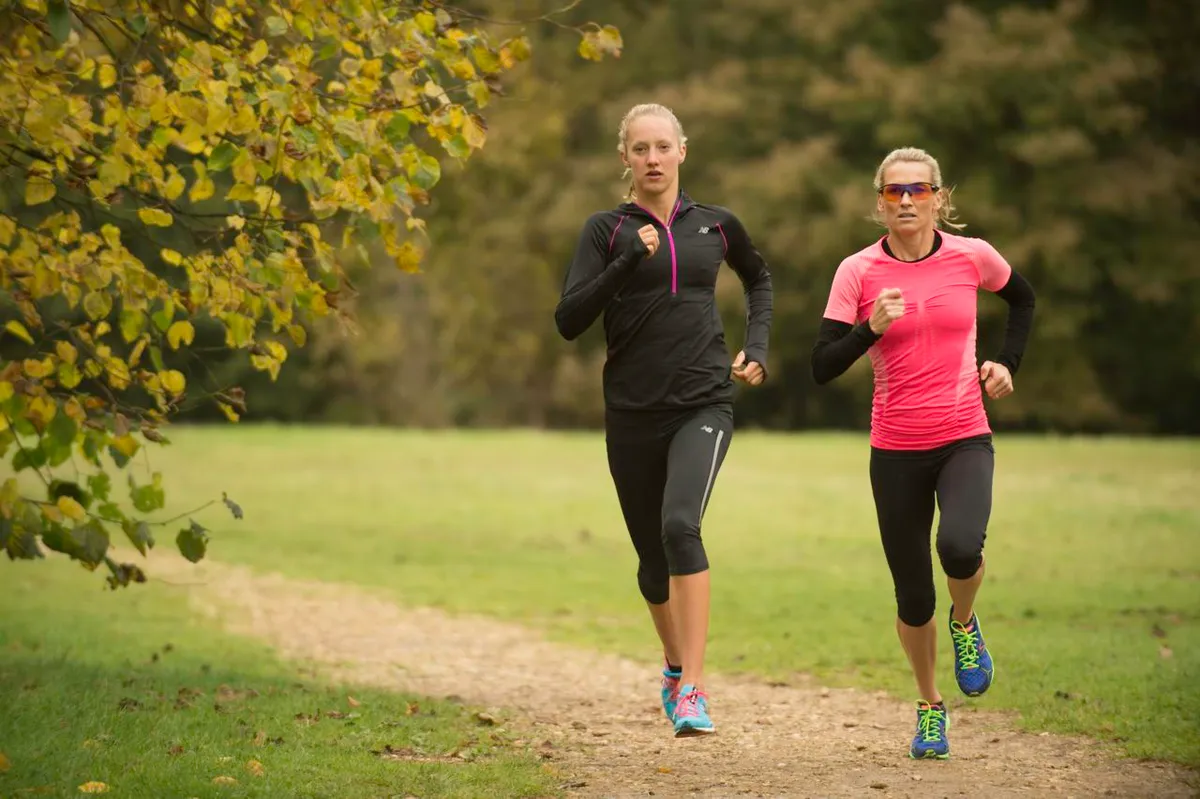
:
If Pallant is to reach the next level, she’ll have to defy a school of thought that ITU racing is beyond anyone who hasn’t spent a childhood following the black line in the pool.
“Everyone says it’s about improving the swim,” Dillon says. “But that’s a small thing compared to where she’s come from in the past two years. We first had to iron out the other problems, the habits formed from her running background. Now we finish every session, even if we have to crawl round. It’s a change of mentality.”
The scale of Pallant’s task is underlined by not being in receipt of lottery funding, nor was she in 2014. British Triathlon will tell you she hasn't hit the required standards in specific races, which is true, but they do have discretion for those with potential.
The reality is that without her swimming being of the front-pack calibre demanded to break into medal contention – or make her useful as a support athlete (domestique or pilot) – means she isn’t yet a useful team player. It’s why Lutterworth’s Lucy Hall got the nod in 2012, because she can swim fast – too fast at times – and pull up the Team GB ‘runners’.
What also hasn't helped is Pallant’s decision to race in the neutral ITU suit in 2014 as she contemplated an offer to switch allegiance to Turkey, who are looking to import talent as has been seen in middle distance racing on the track. While the financial and single-minded drive could be understood, it’s not so palatable for fans, and it wasn’t either for British Triathlon, who refused to sanction the switch, meaning an extended period in limbo would need serving.
“Turkey are hoping to develop triathlon and at one point I had a chat with them,” Pallant says. “I thought I could help in a way. I’m now back for GB. [Former chief executive] Zara Hyde Peters has left British Triathlon and I feel that after chatting with Brendan [Purcell, British Triathlon’s performance director], there is a place for me. I think you don’t always have to be part of a team to inspire other athletes. Performances can connect.”
Pallant’s return to wearing the Union flag coincides with the start of the Olympic selection process and while making the Rio Olympics might be a long shot, neither the triathlete nor coach is giving up.

The indomitable spirit is admirable and who is to say it won’t fall into place. Other than the robust Stimpson, injuries have beset Britain’s best. Stanford missed the entirety of 2014, Jenkins must have felt she’d crossed the path of a black cat after picking up injuries ahead of the last two major championships. Holland was running into her best-ever shape last summer, but now battles a plantar fasciitis problem that won’t see her return until May at the earliest. Those are Britain’s leading four, beneath that a breakthrough should not be ruled out.
“If my swim gets faster, I can be up in these races,” Pallant says. “I finished the year not fussed about running. It’s all about the rectangular blue wet thing. Then I’m aiming for Rio qualification, and doing everything I can to be the best triathlete I can be."
Bring on 2015
The ITU World Series has been extended to 10 races, starting in March in Abu Dhabi and continuing to Chicago in September for the Grand Final. The latter is one of just two races the British selection policy for the Games concerns itself with, the other being the Rio test event in August. There will be an opportunity to make an impression along the way and given how stringent the policy is, it is quite possible that no women triathlete will secure an automatic spot in 2015, which will buy Pallant more time for a one-off early 2016 showdown.
“Ideally we’d love to focus on the whole series,” Dillon says. “But that’s a lot of travelling. Being weaker on the swim, Em needs access to the pool a lot and a lot of travel will compromise her swimming.”
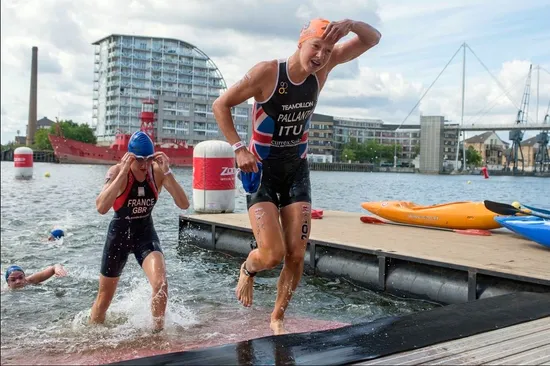
Many readers will be familiar with SwimSmooth, who have partnered with British Triathlon, and Pallant is travelling to Perth over the winter for tuition from head coach Paul Newsome. Confidence is mounting but there is still an awful lot to learn. Not making the front pack in elite ITU racing can effectively mean being out of a two-hour race within the first 20 minutes.
“Paul called my style Kicktastic,” Pallant says. “I’m ok with steady swimming, but the minute the pressure is on in a race, I let my legs go, which throws my timing out.”
“Emma is not afraid of hard work,” Dillon explains. “She needs to be stronger at the front end and drop the kick slightly and emerge V-shaped from winter having swum 50km a week.”
If the plan works, allowing Pallant to more regularly make the front pack, the excitement will be palpable. “When she gets into a race, she won’t have to bike so hard and will see how much easier it is,” Dillon says. “It’s then the big performances will come.“
“In my running days I’d pull the plug in a race because I was used to winning,” Pallant says. “Triathlon has taught me I always have to fight. If no-one in the bike pack is working, I won't be in the race if I just sit up as well. Now I come out of every race having given 100%, controlling the controllables. If my swim is not up to it, it will be a tough day, but every day should be a tough day and that’s what makes me value the sport.”
(Images: Romilly Lockyer)